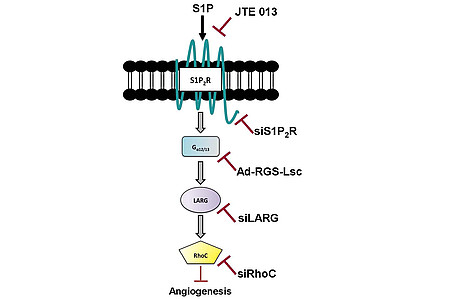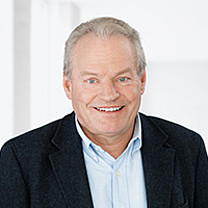You are here
Content
Cardiovascular diseases are still the most common cause of death in developed countries. During the development of heart failure, hypertension, as well as other diseases associated with endothelial dysfunction, e. g. diabetes mellitus, miscommunications between the different cardiovascular cell types and alterations in intracellular signal transduction cascades occur. Heterotrimeric G proteins and monomeric GTPases are pivotal mediators in such signaling cascades in all cardiovascular cell types and thus contribute to the propagation of pathological alterations. We therefore analyze such signaling pathways and their alterations, e.g. in endothelial cells, pericytes and vascular smooth muscle cells.
In particular, we focus on
- Nucleoside diphosphate kinase (NDPK) and its role cardiovascular diseases. This enzyme contributes to the activation of G proteins by providing the required GTP. Especially, the isoform NDPK B is additionally required for the formation of caveolae and can further regulate the function of other proteins, e. g. the potassium channel KCa3.1, by phosphorylation on histidine residues. By the use of NDPK B deficient mice as well as NDPK B depletion in zebrafish embryos as well as cultured endothelial and vascular smooth muscle cells, we characterize the role of this enzyme in vascular biology. As we obtained results indicating its contribution to the development of diabetic retinopathy, alterations in angiogenesis and the formation of a neointima after vessel injury, we intend to establish NDPK B as novel molecular target for small molecule inhibitors.
- Guanine nucleotide exchange factors (GEFs) are proteins catalyzing the activation of monomeric GTPases. Together with GTPase activating proteins (GAPs) they control the activity of monomeric GTPases and thus, cellular responses such as migration and proliferation. It becomes more and more evident that not the global activity of the GTPases, but the local activation in subcellular compartments is critical for the adequate cellular responses and pathological alterations. We are therefore interested in the local regulation of the activity of the GTPase RhoA at endothelial adherens junctions by the poorly characterized GEF RhoGEf17 and p190RhoGAP. With regard to endothelial activation we are further interested in the role of the cAMP-dependent Rap-GEF EPAC1

Project-related publications
- Qiu Y, Zhao D, Butenschön VM, Bauer AT, Schneider SW, Skolnik EY, Hammes HP, Wieland T, Feng Y. Nucleoside diphosphate kinase B deficiency causes a diabetes-like vascular pathology via up-regulation of endothelial angiopoietin-2 in the retina. Acta Diabetol. 53:81-9, 2015.
- Feng Y, Gross S, Wolf NM, Butenschön VM, Qiu Y, Devraj K, Liebner S, Kroll J, Skolnik EY, Hammes HP, Wieland T. Nucleoside diphosphate kinase B regulates angiogenesis through modulation of vascular endothelial growth factor receptor type 2 and endothelial adherens junction proteins. Arterioscler Thromb Vasc Biol. 34: 2292-300, 2014.
- Del Galdo S, Vettel C, Heringdorf DM, Wieland T. The activation of RhoC in vascular endothelial cells is required for the S1P receptor type 2-induced inhibition of angiogenesis. Cell Signal. 25: 2478-2484, 2013.
- Lutz S, Mohl M, Rauch J, Weber P, Wieland T. RhoGEF17, a Rho-specific guanine nucleotide exchange factor activated by phosphorylation via cyclic GMP-dependent kinase Ia. Cell Signal. 25: 630-638, 2013.
- Carbajo-Lozoya J, Lutz S, Feng Y, Kroll J, Hammes HP, Wieland T. Angiotensin II modulates VEGF-driven angiogenesis by opposing effects of type 1 and type 2 receptor stimulation in the microvascular endothelium. Cell Signal. 24: 1261-1269, 2012.
- Hippe HJ, Wolf NM, Abu-Taha HI, Lutz S, Le Lay S, Just S, Rottbauer W, Katus HA, Wieland T. Nucleoside diphosphate kinase B is required for the formation of heterotrimeric G protein containing caveolae. Naunyn Schmiedebergs Arch Pharmacol. 384: 461-472, 2011.
- Wieland T, Hippe HJ, Ludwig K, Zhou XB, Korth M, Klumpp S. Reversible histidine phosphorylation in mammalian cells: a teeter-totter formed by nucleoside diphosphate kinase and protein histidine phosphatase 1. Methods Enzymol. 471: 379-402, 2010.
- Wuertz CM, Lorincz A, Vettel C, Thomas MA, Wieland T, Lutz S. p63RhoGEF - a key mediator of angiotensin II-dependent signaling and processes in vascular smooth muscle cells. FASEB J. 24: 4865-4876, 2010.
- Hippe HJ, Wolf NM, Abu-Taha I, Mehringer R, Just S, Lutz S, Niroomand F, Postel EH, Katus HA, Rottbauer W, Wieland T. The interaction of nucleoside diphosphate kinase B with Gbetagamma dimers controls heterotrimeric G protein function. Proc Natl Acad Sci U S A. 106: 16269-16274, 2009.
- Lutz S, Shankaranarayanan A, Coco C, Ridilla M, Nance MR, Vettel C, Baltus D, Evelyn CR, Neubig RR, Wieland T, Tesmer JJ. Structure of G?q-p63RhoGEF-RhoA complex reveals a pathway for the activation of RhoA by GPCRs. Science 318: 1923-1927, 2007.
Context Column
Contact

Thomas Wieland, PhD
Professor and Chair Experimental Pharmacology Mannheim
Medical Faculty Mannheim
Heidelberg University
Maybachstr. 14
68169 Mannheim
Phone +49 621 383-9610
thomas.wieland@medma.uni-heidelberg.de
